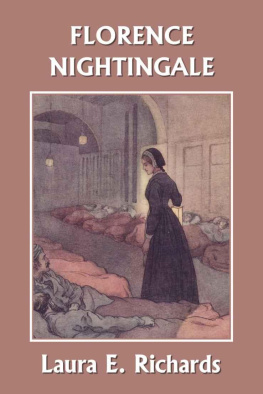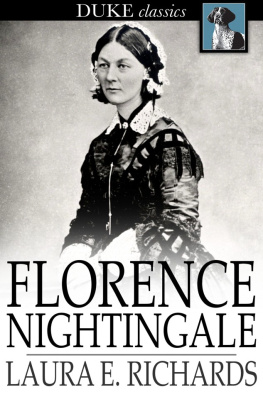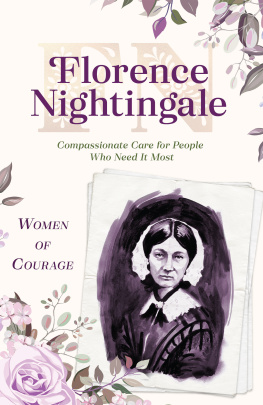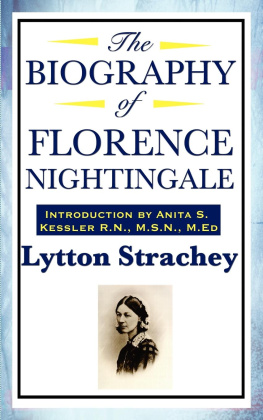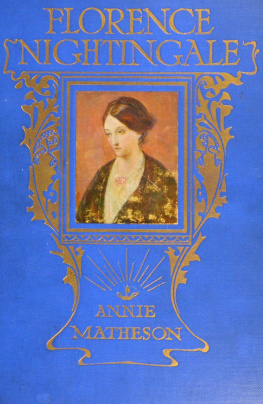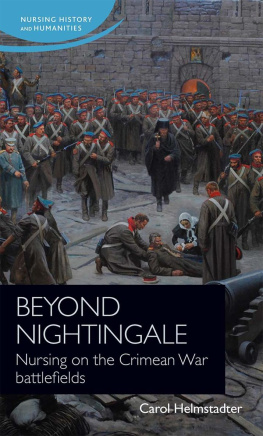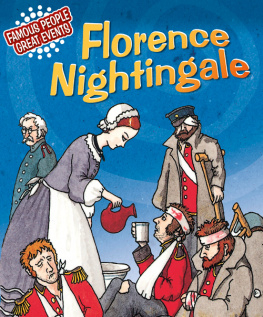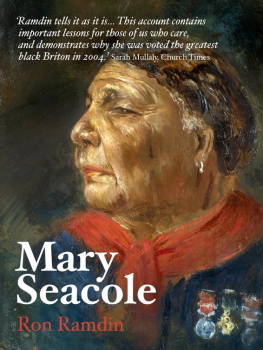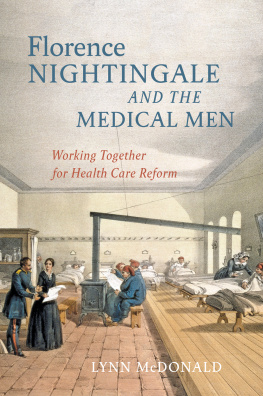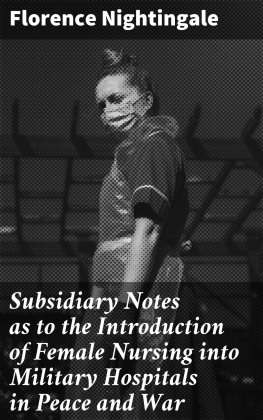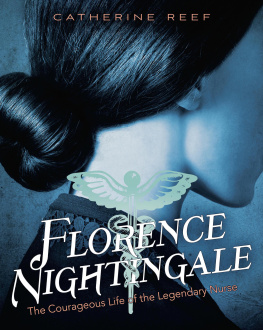Florence Nightingale
by
Laura E. Richards
Yesterday's Classics
Chapel Hill, North Carolina
Cover and Arrangement 2010 Yesterday's Classics, LLC
All rights reserved. No part of this book may be reproduced or retransmitted in any form or by any means without the written permission of the publisher.
This edition, first published in 2010 by Yesterday's Classics, an imprint of Yesterday's Classics, LLC, is an unabridged republication of the work originally published by D. Appleton and Company in 1909. This title is available in a print edition (ISBN 978-1-59915-220-2).
Yesterday's Classics, LLC
PO Box 3418
Chapel Hill, NC 27515
Yesterday's Classics
Yesterday's Classics republishes classic books for children from the golden age of children's literature, the era from 1880 to 1920. Many of our titles are offered in high-quality paperback editions, with text cast in modern easy-to-read type for today's readers. The illustrations from the original volumes are included except in those few cases where the quality of the original images is too low to make their reproduction feasible. Unless specified otherwise, color illustrations in the original volumes are rendered in black and white in our print editions.
Contents
CHAPTER I
How Florence Got Her NameHer Three Homes
O NE evening, some time after the great Crimean War of 1854-55, a company of military and naval officers met at dinner in London. They were talking over the war, as soldiers and sailors love to do, and somebody said: "Who, of all the workers in the Crimea, will be longest remembered?"
Each guest was asked to give his opinion on this point, and each one wrote a name on a slip of paper. There were many slips, but when they came to be examined there was only one name, for every single man hed written "Florence Nightingale."
Every English boy and girl knows the beautiful story of Miss Nightingale's life. Indeed, hers is perhaps the best-loved name in England since good Queen Victoria died. It will be a great pleasure to me to tell this story to our own boys and girls in this country; and it shall begin, as all proper stories do, at the beginning.
Her father was named William Nightingale. He was an English gentleman, and in the year 1820 was living in Italy with his wife. Their first child was born in Naples, and they named her Parthenope, that being the ancient name of Naples; two years later, when they were living in Florence, another little girl came to them, and they decided to name her also after the city of her birth.
When Florence was still a very little child her parents came back to England to live, bringing the two children with them. First they went to a house called Lea Hall, in Derbyshire. It was an old, old house of gray stone, standing on a hill, in meadows full of buttercups and clover. All about were blossoming hedgerows full of wild roses, and great elder-bushes heavy with white blossoms; and on the hillside below it lies the quaint old village of Lea with its curious little stone houses.
Lea Hall is a farmhouse now, but it still has its old flag-paved hall and its noble staircase of oak with twisted balustrade, and broad solid steps where little Florence and her sister "Parthe" used to play and creep and tumble. There was another place near by where they loved even better to play; that was the ancient house of Dethick. I ought rather to say the ancient kitchen, for little else remained of the once stately mansion. The rest of the house was comparatively new, but the great kitchen was (and no doubt is) much as it was in the days of Queen Elizabeth.
Imagine a great room with heavy timbered roof, ponderous oaken doors, and huge open fireplace over which hung the ancient roasting jack. In the ceiling was a little trap-door, which looked as if it might open on the roof; but in truth it was the entrance to a chamber hidden away under the roof, a good-sized room, big enough for several persons to hide in.
Florence and her sister loved to imagine the scenes that had taken place in that old kitchen; strange and thrilling, perhaps terrible scenes; they knew the story of Dethick, and now you shall hear it too.
In that old time which Tennyson calls "the spacious days of great Elizabeth," Dethick belonged to a noble family named Babington. It was a fine house then. The oaken door of the old kitchen opened on long corridors and passages, which in turn led to stately halls and noble galleries. There were turrets and balconies overlooking beautiful gardens; and on the stone terraces gay lords and ladies used to walk and laugh and make merry, and little children run and play and dance, and life go on very much as it does now, with work and play, love and laughter and tears.
One of the gay people who used to walk there was Anthony Babington. He was a gallant young gentleman, an ardent Catholic, and devoted to the cause of the beautiful and unfortunate Mary Queen of Scots.
Though ardent and devoted, Babington was a weak and foolish young man. He fell under the influence of a certain Ballard, an artful and designing person who had resolved to bring about the death of the great English Queen, and was induced by him to form the plot which is known in history as Babington's Conspiracy; so he was brought to ruin and death.
In the year 1586 Queen Mary was imprisoned at Wingfield Manor, a country house only a few miles distant from Dethick. The conspirators gathered other Catholic noblemen about them, and planned to release Queen Mary and set her once more on the throne.
They used to meet at Dethick, where, it is said, there is a secret passage underground leading to Wingfield Manor. Perhapswho knows?they may have sat in the kitchen, gathering about the great fireplace for warmth; the lights out, for fear of spies, only the firelight gleaming here and there, lighting up the dark corners and the eager, intent faces. And when the plot was discovered, and Queen Elizabeth's soldiers were searching the country round for the young conspirators, riding hither and thither along the pleasant country lanes and thrusting their sabres in among the blossoming hedgerows, it was here at Dethick that they sought for Anthony Babington. They did not find him, for he was in hiding elsewhere, but one of his companions was actually discovered and arrested there.
Perhapsagain, who knows?this man may have been hiding in the secret chamber above the trap-door. One can fancy the pursuers rushing in, flinging open cupboards and presses, in search for their prey; and finding no one, gathering baffled around the fireplace. Then one, chancing to glance up, catches sight of the trap-door in the ceiling. "Ha! lads, look up! the rascal may be hiding yonder! Up with you, you tall fellow!" Then a piling up of benches, one man mounting on another's shouldersthe door forced open, the young nobleman seized and overpowered, and brought down to be carried off to London for trial.
Anthony Babington and his companions were executed for high treason, and Queen Mary, who was convicted of approving the plot, was put to death soon after.
All this Florence Nightingale and her sister knew, and they never tired of "playing suppose" in old Dethick kitchen, and living over again in fancy the romantic time long past. And on Sundays the two children went with their parents to old Dethick church, and sat where Anthony Babington used to sit, for in his days it was the private chapel of Dethick. It is a tiny church; fifty people would fill it to overflowing, but Florence and her sister might easily feel that the four bare walls held all the wild history of Elizabeth's reign.

